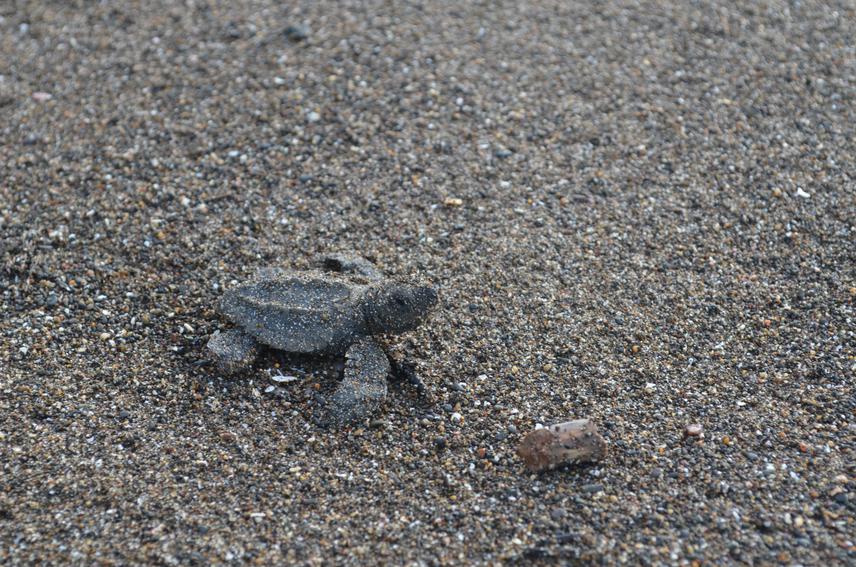Annie Koehler Clift
Throughout our pilot season at Bejuco beach we aim to not only protect threatened sea turtle nests from poaching and predation, but also to increase local awareness and education through community immersion and youth education programs.

Beach hatchling.
With the commencement of a conservation project at Bejuco beach, thanks to the help from The Rufford Foundation, a gap of unprotected sea turtle nesting beach will be closed, thus creating the longest consecutively protected nesting beachfront on the Pacific coast of Central America. Bejuco beach is located in the southern part of the Nicoya Peninsula in Guanacaste, Costa Rica – a hotspot for sea turtle nesting. The area is vital nesting habitat to a large population of olive ridley sea turtles (Lepidochelys olivacea) and a small number of Pacific green (Chelonia mydas), hawksbill (Eretmochelys imbricata) and the Critically Endangered Leatherback (Dermochelys Coriacea) sea turtles.
For the past couple of years local fisherman of Bejuco have been soliciting help to create a developed nesting protection program at Bejuco beach where they have watched hundreds of nests looted by poachers each nesting season. Being the last unprotected beach of the area it faces high poaching pressures from surrounding communities. Through working hand in hand with the local fisherman we will conduct nightly patrols to monitor the nesting activity on the beach and relocate nests to a protected hatchery. We hope to not only educate the fishermen on more sustainable practices, but also the local and surrounding communities on the importance of sea turtle conservation and preserving the unique ecosystems of the area.
A team of local artisanal fisherman and international sea turtle conservationists and biologists living and working together will run the project. The local coordinator Jorge Rojas has grown up in the fishing community of Bejuco and has attempted small efforts to protect sea turtle nests in the past and is eager and excited to begin the pilot season. A group of 5-7 fishermen who work with Jorge in artisanal fishing are excited to be local patrollers and lead nightly patrols to monitor the beach. A hatchery will be constructed for the relocation of nests to ensure their safety during incubation from poaching and predators and the safe release of hatchlings upon emerging. The project will not only provide jobs and a bit of income for the local patrollers but also for two women who will cook for the research team and the fishing group we will rent a house from for the team to inhabit. Overall this project will benefit the community immensely, in economy, education, and community development and have a great impact on the population of turtles nesting here.